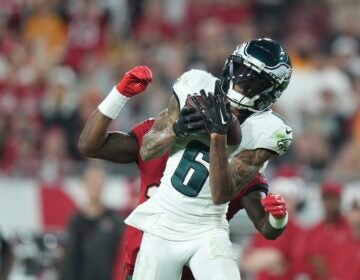PIFA: Exploring the early days of Dizzy Gillespie and bebop
A young Dizzy Gillespie, cocky and with a chip on his shoulder, will stride into Philadelphia this weekend.
“Last Call at the Downbeat,” at Society Hill Playhouse, is part monologue, part concert, and part music lesson by Suzanne Cloud, a local jazz historian.
The script weaves the young life of Diz, still just 24 years old in 1942 when the play is set, with music performed live by a quartet led by trumpeter Duane Eubanks.
“Listen at this, man!” shouts Gillespie, played by Erin Fleming, as Eubanks runs through an A scale on the trumpet. “I learned there are a lot of pretty notes in a chord that are well worth to hold. If you play every note, it’s stiff. So I eliminate those notes, and make it so that the notes are heard without being played.”
The action on stage gets deep into notes. An inventive jazz musician like Gillespie would stretch them out, pull them apart, and flip them around, at one point showing in some detail how the signature riff in Gillespie’s “Woody ‘n’ You” is directly reflected, however warped, in “‘Round Midnight.”
Gillespie rattles off all the chords of the melody as pianist Mike Bond demonstrates each: “B minor, E seventh, B flat minor seventh, E flat seventh, A minor, D seventh, A flat minor seventh, D flat seventh, into C.”
An introduction to bebop
“I teach jazz history. I have to think of ways to get regular ol’ listeners to understand what bebop is,” said Cloud, who is also is the director of the musician support organization Jazz Bridge. “Historically, that’s when people dropped away from jazz. They loved the big bands, and when bebop came along they said, ‘Well, I don’t understand it.’ I’m hoping it will illustrate a little of what bebop was.”
“Last Call” is part of the Philadelphia International Festival of the Arts. As such, it’s set at a very specific time: Nov. 1, 1942, a time when Dizzy Gillespie had just been fired from both the Cab Calloway band (due to an infamous incident involving a spitball and a switchblade) and then the Lucky Millinder band.
Finding himself without a lucrative job, he spent a few weeks playing with a small combo at The Downbeat Club in Philadelphia.
At this moment in time, Gillespie is about to be hired by the Earl Hines band, where he would meet Charlie Parker. The two would then reinvent jazz as bebop.
“You have to remember that the young turks, the young guns, were coming out of big bands. Dizzy was a product of big bands,” said Cloud. “But the young musicians wanted to play in small groups. That’s where you get improvisation.”
Little more than a teenager at the time, Gillespie was cocky and smart with violent streak. But he hadn’t yet established himself as a musician, and there was no guarantee his career, or his musical ideas, would be successful.
“This is his second time he was fired, so early in his career, the truth scares him. By no means is he set, or arrived in his career,” said Fleming, the actor portraying Gillespie.
Fleming admits he, himself, is scared to death of being fired from an acting gig. So far, it hasn’t happened.
“Last Call at the Downbeat” plays for two weeks at the Society Hill Playhouse.
WHYY is your source for fact-based, in-depth journalism and information. As a nonprofit organization, we rely on financial support from readers like you. Please give today.









